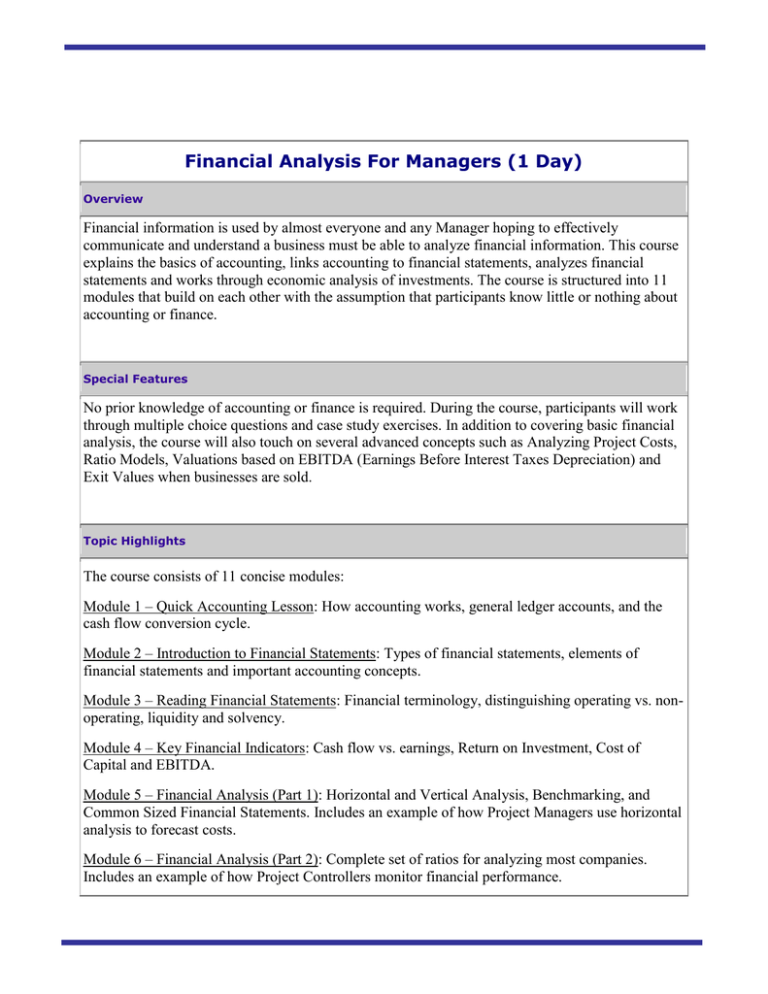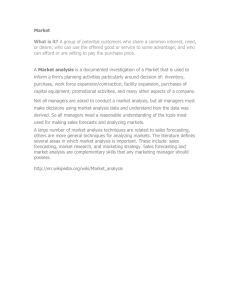Financial Analysis For Managers (1 Day)
advertisement

Financial Analysis For Managers (1 Day) Overview Financial information is used by almost everyone and any Manager hoping to effectively communicate and understand a business must be able to analyze financial information. This course explains the basics of accounting, links accounting to financial statements, analyzes financial statements and works through economic analysis of investments. The course is structured into 11 modules that build on each other with the assumption that participants know little or nothing about accounting or finance. Special Features No prior knowledge of accounting or finance is required. During the course, participants will work through multiple choice questions and case study exercises. In addition to covering basic financial analysis, the course will also touch on several advanced concepts such as Analyzing Project Costs, Ratio Models, Valuations based on EBITDA (Earnings Before Interest Taxes Depreciation) and Exit Values when businesses are sold. Topic Highlights The course consists of 11 concise modules: Module 1 – Quick Accounting Lesson: How accounting works, general ledger accounts, and the cash flow conversion cycle. Module 2 – Introduction to Financial Statements: Types of financial statements, elements of financial statements and important accounting concepts. Module 3 – Reading Financial Statements: Financial terminology, distinguishing operating vs. nonoperating, liquidity and solvency. Module 4 – Key Financial Indicators: Cash flow vs. earnings, Return on Investment, Cost of Capital and EBITDA. Module 5 – Financial Analysis (Part 1): Horizontal and Vertical Analysis, Benchmarking, and Common Sized Financial Statements. Includes an example of how Project Managers use horizontal analysis to forecast costs. Module 6 – Financial Analysis (Part 2): Complete set of ratios for analyzing most companies. Includes an example of how Project Controllers monitor financial performance. Module 7 – Analyzing Costs: Cost control concepts and how to analyze detail project costs. Module 8 – Concepts in Finance: Present and Future Values, Net Present Value, Quantifying Benefits and Discounted Payback. Module 9 – Basic Forecasting: Forecasting sales, assets and cash flow, fixed vs. variable cost, and breakeven analysis. Includes an example of how Project Managers use parametric variables to forecast costs. Module 10 – Risk Analysis: Risk adjusting constant dollars, expected values and simulation analysis. Module 11 – Additional Concepts: Internal Controls and Sarbanes Oxley, Ratio Models, Exit Values, Intellectual Capital and XBRL Financials. Audience Any professional who wants a good overall understanding of financial analysis and economic analysis of long term investments. Instructor Matt H. Evans, CPA, CMA, CFM – Mr. Evans is an independent consultant and Associate of Business Performance Group in the Washington D. C. area. He has over 25 years experience working as a Senior Managing Consultant, Financial Manager, Controller, and Senior Analyst. He has led major projects ranging from system implementation projects for Fortune 100 companies to design and deployment of performance management systems within the federal public sector. Mr. Evans also has hands-on experience with financial analytical projects such as Cost Benefit and Risk Analysis of $ 1 billion investments, Financial Profiling of Private Companies, and Financial Forecasting Models. He has experience in every aspect of accounting – Financial Reporting, Fixed Asset Accounting, Project Cost Accounting, Payroll, Billings, and Cash Flow Management. Mr. Evans earned his B.S. degree in Accounting from Louisiana State University. He holds three professional certifications – Certified Public Accountant, Certified Management Accountant and Certified in Financial Management. He has also completed executive education programs at the Wharton Business School and J. L. Kellogg Graduate School of Management.

